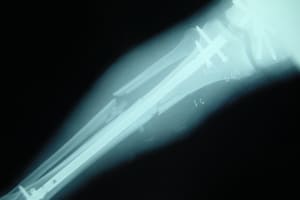
The Food and Drug Administration (FDA) issued a safety announcement in September warning patients and health care providers of an increased risk of bone fractures in patients taking the type 2 diabetes drugs Invokana and Invokamet (canagliflozin). The FDA deemed the new safety announcement necessary because bone fractures have been seen in patients taking canagliflozin. […]

Invokana Increases Risk of Bone Fractures
The Food and Drug Administration (FDA) issued a safety announcement in September warning patients and health care providers of an increased risk of bone fractures in patients taking the type 2 diabetes drugs Invokana and Invokamet (canagliflozin).
The FDA deemed the new safety announcement necessary because bone fractures have been seen in patients taking canagliflozin. Fractures can occur as early as 12 weeks after the patient starts taking Invokana, according to the safety announcement. Canagliflozin has also been linked to decreases in bone mineral density of the hip and lower spine.
Invokana and Invokamet labels already carried information about the risk for bone fractures in the adverse reactions section. The FDA updated the information under the Warnings and Precautions section of the label after recent clinical trials confirmed the increased risk of fractures. A clinical trial in elderly patients found that those who took canagliflozin for more than two years had reduced bone mineral density in their hips and lower spines. The FDA has added that information to the adverse reactions section of the drug’s label.
The FDA recommends that health care professionals consider the factors that contribute to a patient’s fracture risk prior to prescribing canagliflozin. Patients should discuss any factors that may increase their risk for bone fractures, but the FDA cautions that patients should not stop or change any diabetes medicine without first discussing this with a health care professional.
Invokana received FDA approval in 2013—the first drug in a new class of type 2 diabetes medications: sodium-glucose co-transporter 2 (SGLT-2) inhibitors. In 2014, the FDA approved Invokamet, a combination drug containing canagliflozin and metformin. These medications are used, in addition to diet and exercise, to help control blood sugar in adults with type 2 diabetes. Poorly controlled blood sugar can lead to a number of serious health consequences including blindness, nerve and kidney damage, and heart disease.
This is the second safety warning for Invokana this year. In May, the FDA warned that Invokana could cause ketoacidosis, a dangerous condition in which toxic acids accumulate in the blood, Drugwatch.com reports. If not treated, ketoacidosis can be fatal.
The FDA is continuing to evaluate the risk of bone fractures with other drugs in the SGLT-2 inhibitor class, including Farxiga and Xigduo (dapagliflozin), and Jardiance, Glyxambi, and Synjardy (empaglifozin) to determine if additional label changes or studies are needed.


